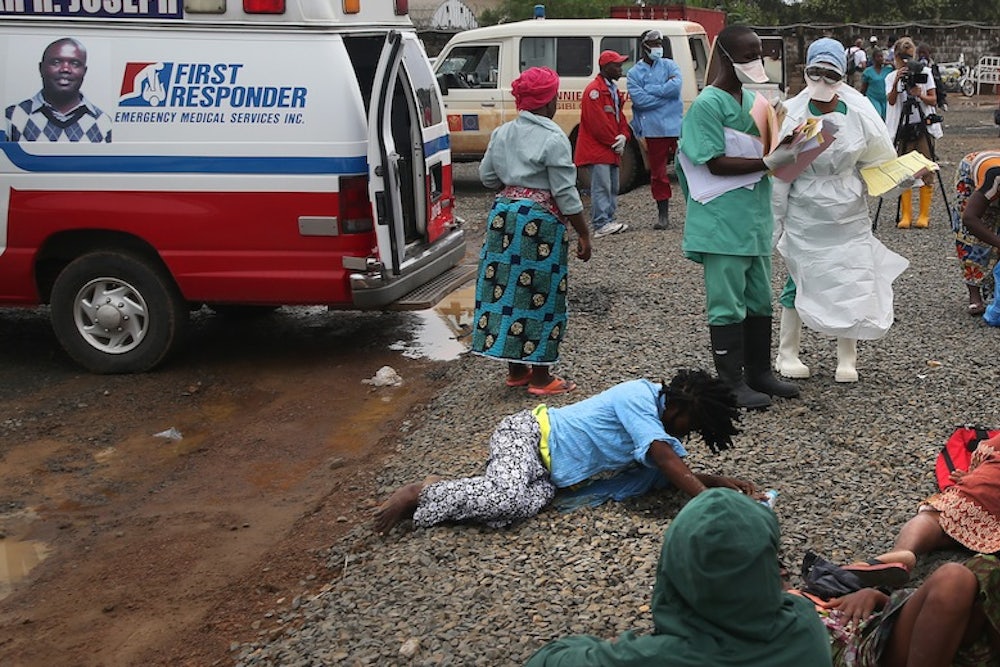John McCain suggested Sunday on CNN's State of the Union that what the Ebola crisis really needs is one official, coordinating the government response. "I would say that we don't know exactly who's in charge. There has to be some kind of czar. I think that we have to look at people coming into the United States, not only at our airports here but the places where they leave from."
McCain isn’t the first person to float this idea. Several other Republicans, Senators Rob Portman and Jerry Moran, as well as Congressman Jack Kingston, have said that Ebola requires a top official to coordinate responses to the West African epidemic plus the two cases at home. And there are certainly times when tapping one, high-profile official to manage multiple agencies is necessary. But, at least so far, there's no obvious reason to think this is one of those times. According to Administration officials, Lisa Monaco, Obama's Homeland Security and Counterterrorism Advisor, is coordinating domestic agencies at the White House, while the U.S. Agency for International Development (USAID) is coordinating the international response. If there’s infighting or confusion or other signs of disorganization, they haven’t come to light yet.
Meanwhile, other needs are clear—very, very clear. If Congress really wants to feel useful, there are a few ways they can help. But, surprise, some of the same people calling for a “czar” are opposed to these solutions:
1. Restore federal funding for medical research.
The National Institutes of Health's budget for the past decade has been stagnant. In today's dollars, it’s lost 23 percent of its funds due to inflation. But the National Institute of Allergy and Infectious Diseases, a part of the NIH that has been working on a vaccine since 2001, has seen its funding decline even more. In fact, Dr. Francis Collins, the head of the National Institutes of Health, told the Huffington Post's Sam Stein that the NIH would have a vaccine by now if the agency had not seen these budget cuts. It is testing a vaccine right now, but on monkeys, and it could be be years before it is ready. Collins says a full-scale "dream" vaccine development would be to test two different vaccines, being developed in Canada and America, with 30,000 people. Those are resources the NIH just doesn't have. "Frankly, if we had not gone through our 10-year slide in research support, we probably would have had a vaccine in time for this that would've gone through clinical trials and would have been ready," Collins said.
This isn't a new warning, by the way. But the same Republicans now calling for a czar have opposed restored funding for the NIH. "I support the NIH's core responsibility of basic research, but believe it should stop the frivolous, politically motivated, and wasteful grants it has been funding," Kingston, who is chairman of the House Appropriations subcommittee in charge of the NIH's budget, wrote to Collins last year. "On behalf of the American taxpayer, my committee will continue strict oversight of the NIH budget and encourage Dr. Collins to work with us on spending tax dollars effectively and appropriately."
2. Better guidance for health care workers.
As my colleague Jonathan Cohn writes, the second patient, a health care worker who treated the first Ebola victim, should never have contracted Ebola in the first place if all protocols were followed. One way to prevent that from happening in the future would be to offer more uniform preparation across hospitals and clarified guidelines for health care workers. The CDC seems to be transitioning to this model with several new recommendations, but it may need to dispatch CDC employees to make sure hospitals are following them.
Somebody else has been conspicuously absent as the Ebola saga has unfolded. And Congress is the reason why. The Surgeon General's office is still vacant, because Senate Republicans have filibustered Obama's nominee, Vivek Murthy. The National Rifle Association campaigned against his confirmation because of some comments he made, suggesting that gun violence is a health issue. While the Surgeon General admittedly may not play a major part in responding to Ebola—that's more CDC's turf—he does play a visible role in medical communications.
3. More aid to West Africa.
This final step is the most common sense. Most experts say that the best thing the U.S. can do to combat Ebola isn't to ban all flights from afflicted countries or even to provide better training to American doctors. It's to attack Ebola at its source, because you simply can't eliminate the threat of more cases in the U.S. without controlling the outbreak abroad. And that’s not to mention the humanitarian imperative. How can the U.S. close its borders to Liberia, Guinea, and Sierra Leone, causing those countries economic harm while watching thousands more succumb to the disease in these countries?
A coordinated international response could make a real difference in containing the outbreak. The U.S. has already taken some important steps: It is sending military personnel over to help construct new treatment centers, to help with the movement of food and supplies, and to train more workers. Now the Obama Administration is requesting to redirect $1 billion of existing defense spending to fund the U.S. effort. But some lawmakers remain skeptical. GOP Senator David Vitter has made noise that the funding inappropriately "focuses on Africa, and largely ignores our own borders," urging colleagues to block the funding in a letter to the Senate Appropriations Committee.
